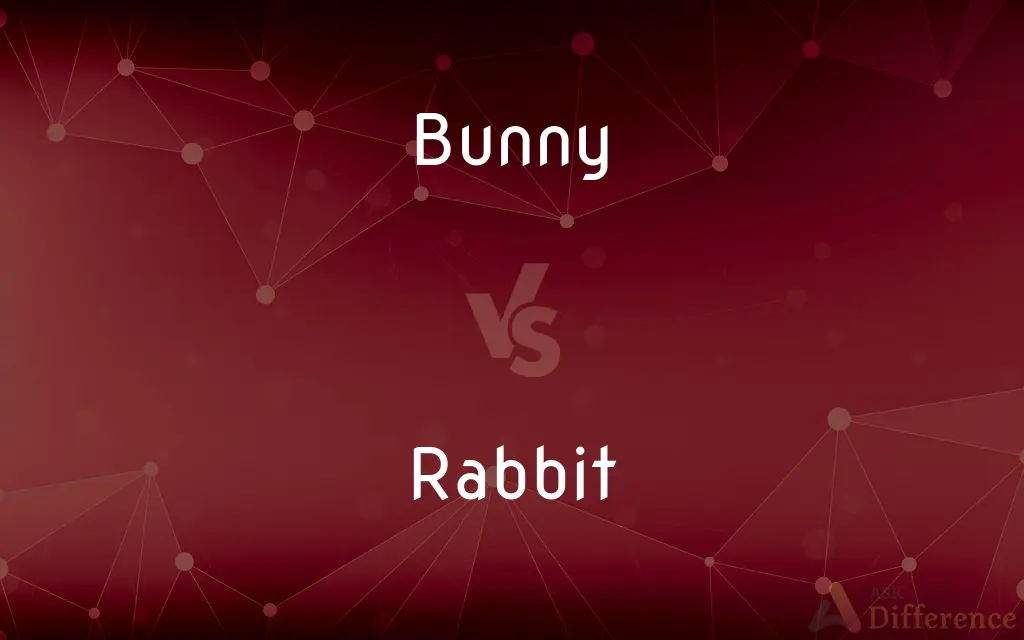Bunny vs. Rabbit — What's the Difference?
By Tayyaba Rehman — Updated on October 3, 2023
"Bunny" is an informal, affectionate term for a rabbit, often used in the context of young or domestic rabbits, while "Rabbit" is a formal term, referring to all animals within the species, irrespective of age or domesticity.

Difference Between Bunny and Rabbit
Table of Contents
ADVERTISEMENT
Key Differences
Understanding "Bunny" and "Rabbit" begins with acknowledging that "Rabbit" constitutes a formal and broadly applicable term, encompassing all animals within the specific species. In stark contrast, "Bunny" emanates from a colloquially affectionate perspective, typically denoting either young rabbits or those in a domesticated context. Thus, "Bunny" emerges as a subset within the broader categorization encapsulated by "Rabbit."
"Bunny" carries with it an inherently gentle and tender connotation, often utilized in child-centric contexts or when discussing pet rabbits. On the other hand, "Rabbit" establishes itself as a neutral and scientifically accurate term, untouched by the sentimental undertones imbued within "Bunny," and applicable in all instances pertaining to the species, whether wild, domestic, young, or adult.
In practical, everyday usage, "Bunny" might find itself utilized in sentences like, "The little bunny hopped across the yard," reflecting an informal and endearing tone. In contrast, "Rabbit" would surface in contexts like, "The European rabbit is a species found in several parts of the world," revealing its suitability for formal and informative discourse.
In a culinary context, the distinction becomes notably clear: dishes are typically referred to as comprising "Rabbit," owing to the formal and neutral nature of the term, while "Bunny" would be considered inappropriate and potentially distasteful in such an environment due to its cuddly connotations.
Furthermore, in the cultural and literary realms, "Bunny" often surfaces as a character name or descriptor in children's stories due to its gentle and friendly resonance, while "Rabbit" may be employed in a wider range of contexts, spanning from children’s tales to scientific documentation, due to its universal applicability.
ADVERTISEMENT
Comparison Chart
Tone & Connotation
Informal, endearing
Formal, neutral
Typical Context
Pets, young rabbits
All members of the species
Usage in Literature
Common in children’s stories
Used broadly in various contexts
Culinary Reference
Inappropriate due to cuddly connotation
Commonly used to describe dishes
Scope
Subset of “Rabbit”
Encompasses all of the species
Compare with Definitions
Bunny
An affectionate term for a rabbit.
The little bunny was soft and cuddly.
Rabbit
A mammal known for its long ears and strong hind legs.
The rabbit jumped high to reach the leaves.
Bunny
Slang for a cute, adorable rabbit.
He gifted her a plush bunny for her birthday.
Rabbit
Denoting all ages and types within the species.
The scientist studied various rabbit breeds.
Bunny
A word often used in child-friendly contexts.
She loved reading stories about bunnies.
Rabbit
A burrowing, gregarious, plant-eating mammal.
The rabbit darted quickly across the field.
Bunny
A rabbit, especially a young one.
Rabbit
Used in culinary contexts to describe dishes.
The menu featured a stewed rabbit special.
Bunny
A person of a specific type
A dumb bunny.
Rabbit
Any of various long-eared, short-tailed, burrowing mammals of the family Leporidae, such as the commonly domesticated species Oryctolagus cuniculus, native to Europe and widely introduced elsewhere, or the cottontail of the Americas.
Bunny
(Sports) A shot that is uncontested or should be easily made, as in basketball.
Rabbit
A hare.
Bunny
A rabbit, especially a juvenile.
Rabbit
The flesh of a rabbit, used as food.
Bunny
A bunny girl: a nightclub waitress who wears a costume having rabbit ears and tail.
Rabbit
The fur of a rabbit or hare.
Bunny
(sports) In basketball, an easy shot (i.e., one right next to the bucket) that is missed.
Rabbit
A competitor who is designated to set a fast pace for a teammate during a long-distance race.
Bunny
A menstrual pad.
Rabbit
A racehorse that is run at a fast pace early in a race in order to tire the favorite so that another horse can take the lead.
Bunny
A swelling from a blow; a bump.
Rabbit
A mechanical decoy that is propelled around the track in a greyhound race to incite the dogs.
Bunny
(mining) A sudden enlargement or mass of ore, as opposed to a vein or lode.
Rabbit
To hunt rabbits or hares.
Bunny
A culvert or short covered drain connecting two ditches.
Rabbit
A mammal of the family Leporidae, with long ears, long hind legs and a short, fluffy tail.
The pioneers survived by eating the small game they could get: rabbits, squirrels and occasionally a raccoon.
Bunny
A chine or gully formed by water running over the edge of a cliff; a wooded glen or small ravine opening through the cliff line to the sea.
Rabbit
(uncountable) The meat from this animal.
Bunny
Any small drain or culvert.
Rabbit
(uncountable) The fur of a rabbit typically used to imitate another animal's fur.
Bunny
A brick arch or wooden bridge, covered with earth across a drawn or carriage in a water-meadow, just wide enough to allow a hay-wagon to pass over.
Rabbit
A runner in a distance race whose goal is mainly to set the pace, either to tire a specific rival so that a teammate can win or to help another break a record; a pacesetter.
Bunny
A small pool of water.
Rabbit
(cricket) A very poor batsman; selected as a bowler or wicket-keeper.
Bunny
Easy or unchallenging.
Let’s start on the bunny slope.
Rabbit
(comptheory) A large element at the beginning of a list of items to be bubble sorted, and thus tending to be quickly swapped into its correct position. Compare turtle.
Bunny
Resembling a bun small bread roll.
Rabbit
Rarebit; Welsh rabbit or a similar dish: melted cheese served atop toast.
Bunny
A great collection of ore without any vein coming into it or going out from it.
Rabbit
A pneumatically-controlled tool used to insert small samples of material inside the core of a nuclear reactor.
Bunny
A pet name for a rabbit or a squirrel.
Rabbit
(intransitive) To hunt rabbits.
Bunny
A young waitress in a night club whose costume includes a rabbit-tail and ears
Rabbit
To flee.
The informant seemed skittish, as if he was about to rabbit.
When the three friends heard someone behind them yell, "police, freeze!" they each rabbited in a different direction.
Bunny
(usually informal) especially a young rabbit
Rabbit
To talk incessantly and in a childish manner; to babble annoyingly.
Rabbit on
Stop your infernal rabbiting! Use proper words or nobody will listen to you!
Bunny
Informal language typically referring to young rabbits.
The bunny nibbled on a carrot happily.
Rabbit
Confound; damn; drat.
Bunny
Common vernacular for a pet rabbit.
Their bunny likes to hop around the living room.
Rabbit
Any of the smaller species of the genus Lepus, especially the common European species (Lepus cuniculus), which is often kept as a pet, and has been introduced into many countries. It is remarkably prolific, and has become a pest in some parts of Australia and New Zealand.
Rabbit
Any of various burrowing animals of the family Leporidae having long ears and short tails; some domesticated and raised for pets or food
Rabbit
The fur of a rabbit
Rabbit
Flesh of any of various rabbits or hares (wild or domesticated) eaten as food
Rabbit
Hunt rabbits
Rabbit
A formal term describing an animal species.
Rabbits can be found in various global regions.
Common Curiosities
Is "rabbit" a formal term?
Yes, "rabbit" is used formally and scientifically to describe the species.
Do all rabbits belong to the same species?
There are various species and breeds within the rabbit family.
Is "bunny" a scientific term?
No, "bunny" lacks scientific connotations and is colloquial.
Can "bunny" be used to describe all rabbits?
Yes, but it’s commonly reserved for pets or young rabbits.
Is "rabbit" used in culinary language?
Yes, dishes often list “rabbit,” not "bunny."
Can "rabbit" refer to both wild and domesticated types?
Yes, "rabbit" refers to all individuals within the species.
Are all young rabbits called bunnies?
No, "bunny" is an informal term and not a scientific classification.
Can "bunny" be used in formal writing?
It’s uncommon, as "bunny" is informal and "rabbit" is preferred.
Share Your Discovery

Previous Comparison
Cape vs. Cloak
Next Comparison
Dale vs. ValleyAuthor Spotlight
Written by
Tayyaba RehmanTayyaba Rehman is a distinguished writer, currently serving as a primary contributor to askdifference.com. As a researcher in semantics and etymology, Tayyaba's passion for the complexity of languages and their distinctions has found a perfect home on the platform. Tayyaba delves into the intricacies of language, distinguishing between commonly confused words and phrases, thereby providing clarity for readers worldwide.
















































